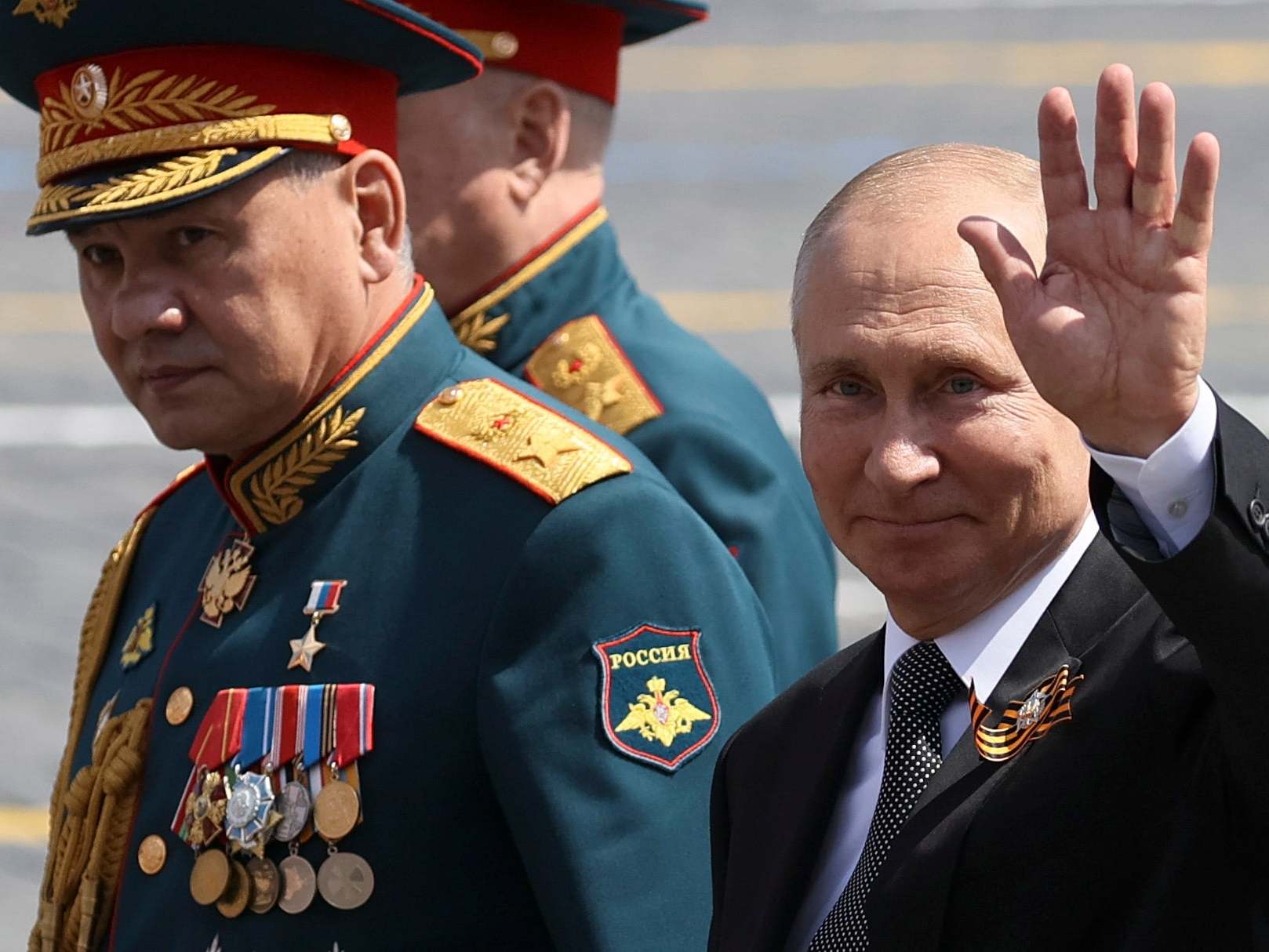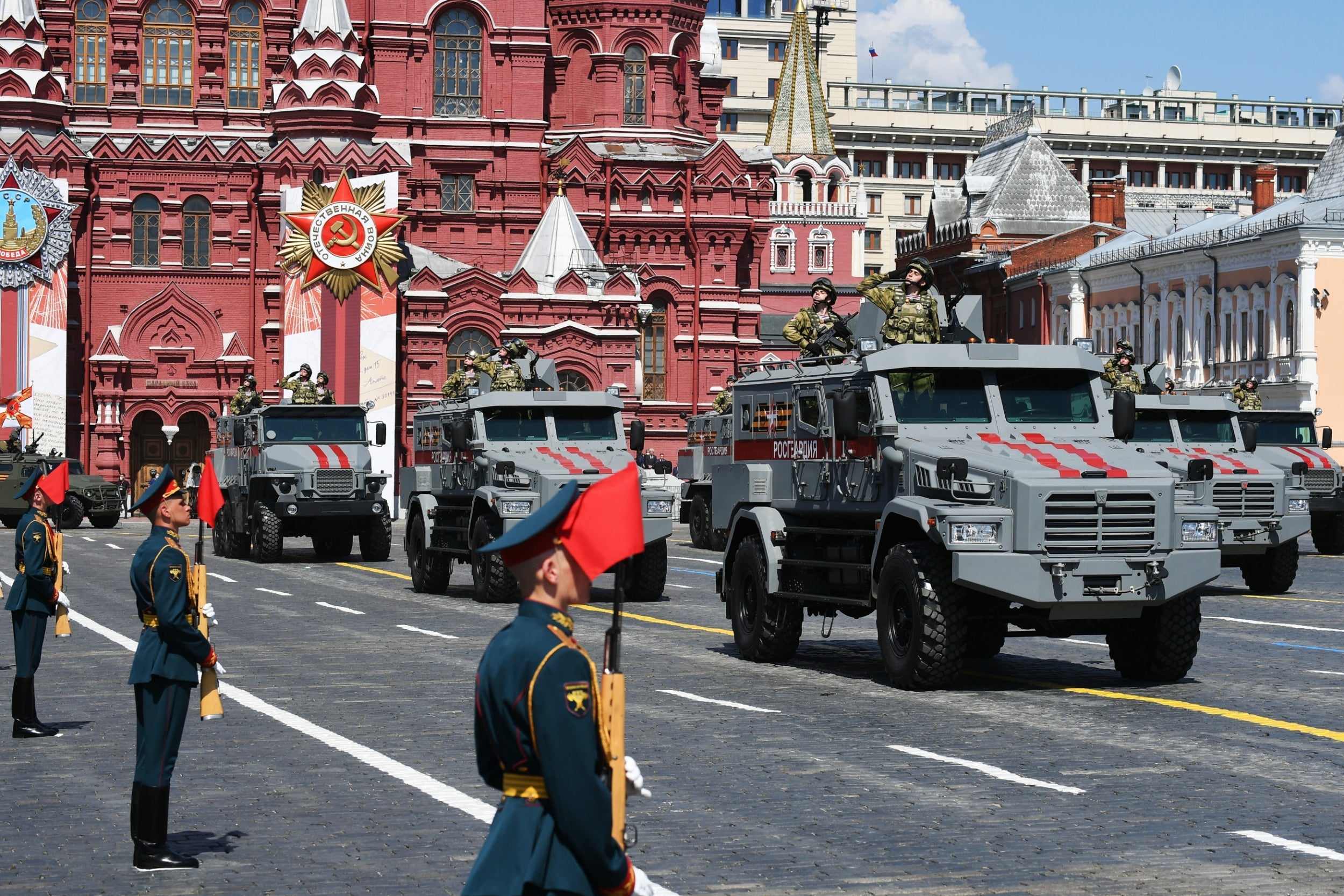Russia holds Victory Day parade in face of coronavirus fears and popular bewilderment
Rescheduled event went ahead in 28 cities across Russia despite continuing pandemic, as Ollie Carroll reports


Vladimir Putin was in a sombre mood on Wednesday as he presided over a military exhibition on Red Square to mark the 75th anniversary of victory in the Second World War.
The decision to hold the parade, as he knew, was controversial, with much of Russia still grappling with the first wave of the disease. At least 30 major cities cancelled their parades over health fears. In the parallel reality of Moscow outside the Red Square cordon, mayor Sergei Sobyanin was urging residents to stay at home, and watch the event from their TV sets.
In a brief and unusually understated address, the Russian president paid tribute to the sacrifices the Soviet Union made in defeating fascism – and offered only passing criticism of the west.
“It is impossible to imagine the future of the world if the Red Army had not defended it,” he said. “On the front line and behind the lines, in partisan detachments and in the underground, soldiers fought and worked bravely and as one.”

Victory Day, usually marked on 9 May, is the one undisputed fixture of the Russian national calendar. It brings together citizens of all political hues in remembering the staggering 27 million Soviets estimated to have lost their lives in the war. In his two decades in power, Mr Putin has leveraged the symbolism of the day, and in 2008 returned tanks, rocket launchers and strategic launchers to his showpiece parade.
This year’s ceremony, likely to be the last major anniversary for surviving veterans, was initially billed as a major international event. That changed when hospitals began filling up with Covid-19 pneumonia in April and the Kremlin – reluctantly – cancelled.
For Mr Putin, it was an obvious, personal disappointment.
Growing up in the ruins of post-war Leningrad, present-day St Petersburg, his childhood was dominated by the city’s legendary 900-day siege in which his own brother died. Some of the tales of those years made their way into a 9,000-word essay published last week in The National Interest — an article was perhaps more notable for its controversial attacks on Poland and the Baltic States, and defence of the Soviet pact with Hitler.
Just as crucially, this year’s nationalistic feel-good celebrations were supposed to dovetail with a 22 April vote on constitutional amendments that would allow Mr Putin to rule until 2036.
The Kremlin surprised most observers by rescheduling both events in quick time: the victory parade for as early as 24 June, the anniversary of the first parade in 1945, and the plebiscite for an unprecedented week of voting, beginning this Thursday.
“Putin has shown that both events are of crucial importance to him,” says Maria Lipman, an author and close observer of Russian politics. “Undoubtedly, he counted on using the parade to improve people’s moods and tell them that his Russia is great.”
The quick rescheduling has had its downsides. The Kremlin had hoped for a star VIP list including the French and Chinese presidents. Instead, it had to make do with delegations from Bosnia and Herzegovina, Kyrgyzstan, Moldova, Serbia, Tajikistan, South Ossetia, Abkhazia, Kazakhstan, Uzbekistan and Belarus. The president of Croatia withdrew late, citing technical problems with his plane. Ukrainian president Volodymyr Zelensky was, the Kremlin says, never invited.
Flanked by Alexander Lukashenko of Belarus on his left and Kassym-Jomart Tokayev of Kazakhstan on his right, Mr Putin presided over a scaled-down parade. In the first part of the ceremony, a total of 14,000 troops, including foreign divisions from India and China, marched across the cobbles. The second part, all about steel, saw 75 aircraft fly overhead and 234 armoured vehicles trundle across the square.
There was relatively little in the way of new military hardware, besides the newest T90M tank, dubbed to become the Russian army’s main battle machine.

For Mr Putin, it was a time to reflect on what might have been – and the destructive effect a small virus had on both elements of his grand storyboard.
In one shocking – though disputed – poll published last week, seven in ten Russians said they disagreed with the decision to go ahead with the rescheduled parade. Remarkably, dissent was highest (89 per cent) among those 75 years or older, a cohort usually considered to be most loyal to the president and the idea of remembering the war.
Sergei Belanovsky, the sociologist who led that polling, argued the results were reflective of a disintegration of the key constituencies of Mr Putin’s support.
Other sociologists have disputed Mr Belanovsky’s methodology, saying it exaggerates the protest mood. But other polling also seems to reflect more general disillusionment with the Kremlin’s handling of the Covid-19 crisis, most especially its financial support, or lack thereof.
As for the rearranged constitutional vote, Levada Centre, the last remaining major independent polling organisation, this week found that only 25 per cent of Russians would vote for the amendments if they had the chance for voting for something else.
Mr Putin began to address the issue of his faltering support on Tuesday with a televised address unveiling several populist measures. He announced tax cuts for IT firms, as well as substantial new child support packages of £120 per child under 16, a move designed to help Russia’s poorest families. The president also abandoned Russia’s flat tax system to introduce a new top rate of income tax, with the proceeds being earmarked for disabled children.
According to Ms Lipman, the generous package is unlikely to affect voting patterns in any significant way, but it might do something to address the overall mood.
“The vote is a travesty, it will be delivered, and people can see that,” she said. “But when it’s over, and summer plays out, and if the epidemic continues to decline, then the handouts might buy some level of acquiescence.”
Join our commenting forum
Join thought-provoking conversations, follow other Independent readers and see their replies
Comments